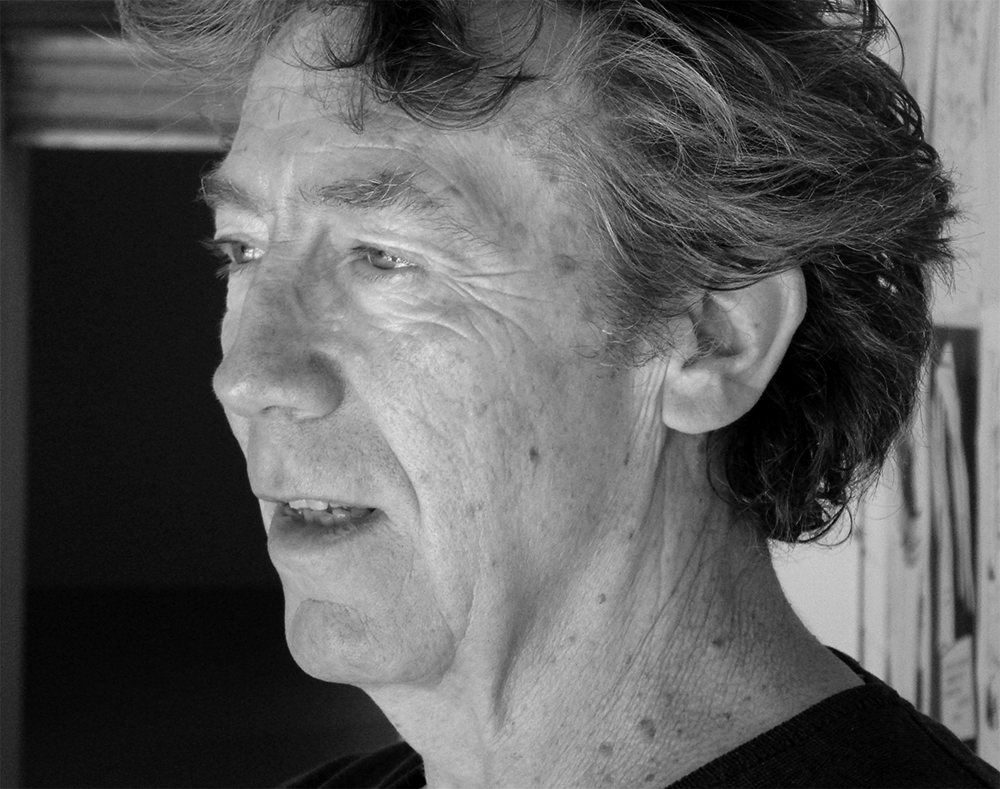
Perhaps I’ve spent too long in the self-help sections of bookshops, expecting to find the secret to long life and enduring happiness written down somewhere. As a poet, I am preternaturally worried about poetry running out on me: the inspiration drying up, the fun of it going out for a pack of cigarettes one day and never coming back, leaving me with nothing but a sink full of dishes and a manuscript full of melancholy poems about birds.
When I first read Ken Bolton and Peter Bakowski’s 2019 collaboration The Elsewhere Variations, I laughed. At first because of the humour – a truck sends the poem’s speaker into a ditch where they marvel at the names on the passing shipping containers ‘Tranter Parisian, Murray Australian Pie…Adamson and Fish… Judith Beverage, Bolton Drivel’ – but secondly, at the idea of two poets a generation older than me writing poetry to make each other laugh, as much as anything else.
I became interested in how Ken and Peter worked with one another, with an eye to discovering the conditions which allow poetic collaborations to remain fresh and full of humour, in the same way people examine the diets of people in Blue Zones, like Okinawa and Ikaria.
Pulling this interview together had its own, unique process, given that Peter and I both live in Melbourne, and Ken in Adelaide. Conscious of Omicron which was sweeping Australia in summer 21/22 and all suffering from Zoom fatigue, we decided to conduct the interview via email. I sent the questions to Peter who sent his answers to Ken, who sent them back to me. Like the poems themselves, this collaborative process took place ‘on the page’.
Throughout the two weeks of the interview’s lifespan, Peter emailed numerous black and white images of old race cars being driven recklessly around tracks with subject headings like ‘Ken Bolton races to the shops to get bread and milk’, and ‘Dom records Bakowski and Bolton on the home stretch’, I caught Covid at a wedding, and Ken very kindly corrected my spelling and grammar, which I was unable to blame on the virus.
Dom Symes: My first question is how did you become aware of each other? What was the early part of your relationship like and how did this develop into a working relationship – roughly up until when this collaboration became a possibility?
Peter Bakowski: I first became aware of Ken being the editor and publisher of Otis Rush and formally submitted poems to him. Ken accepted three in 1989 for Otis Rush #5. As one of my poems was about listening to Olé by John Coltrane, a correspondence started, then I mentioned that Helen and I were coming to Adelaide and could we please be billeted at Cath (Kenneally) and Ken’s, to which they agreed. While staying with them I perused Ken’s library of contemporary American poets and subsequently delved into the poetry of Frank O’Hara and Ron Padgett who became influences. There were subsequent stays at Cath and Ken’s with more talk about admired and influencing countries, music, and poets. In my 2014 poetry collection Personal Weather there’s a poem titled ‘Some lines are straight, some bend a little’ in which I praise both Ken and Ron Padgett’s ability to successfully detour in a poem. I sent a slightly different version of the poem to Ken, a version which mentions cufflinks as in my mind Ken had mentioned cufflinks in one of his poems. I suggested (without pressure) that Ken ‘respond’ directly or obliquely to my poem ‘Some lines are straight, some bend a little’ and he did with his poems titled ‘Phew’ and ‘Roadtrain’ to which I then responded. Our thought but not overthought accumulated responses to each other’s poems became a book length collection of poems, The Elsewhere Variations which was published in 2019 by Wakefield Press. Personally, I considered our fun and uncharted collaboration begun when Ken responded via a poem to ‘Some lines are straight, some bend a little’.
Ken Bolton: That’s about my memory of it too. It was a year or so on that I finally responded with two poems – and suggested two more by him then one by me would round it out as a unit of six, a ‘sixpack’.













